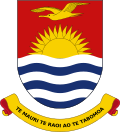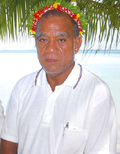| President of Kiribati | |
|---|---|
| Beretitenti o Kiribati (Gilbertese) | |
 Seal of Government of the Republic of Kiribati | |
| Executive branch of the Government of Kiribati | |
| Term length | Four years, renewable twice |
| Constituting instrument | Constitution of Kiribati (1979) |
| Inaugural holder | Ieremia Tabai |
| Formation | 12 July 1979 |
| Deputy | Vice President of Kiribati |
| Salary | AUD 17,900/US$ 12,013 annually [1] |
| Website | https://www.president.gov.ki/ |
 |
|---|
| Subdivisions |
The president of Kiribati (Gilbertese : Beretitenti [2] ) is the head of state and head of government of Kiribati. [3] [4]
Contents
Following a general election, by which citizens elect the members of the House of Assembly, members select from their midst "not less than 3 nor more than 4 candidates" for the presidency. No other person may stand as candidate. The citizens of Kiribati then elect the president from among the proposed candidates with first-past-the-post voting. [5]








